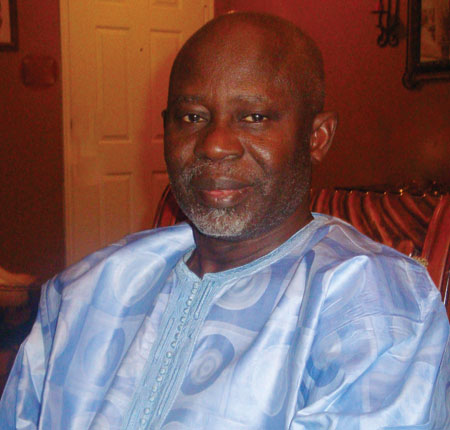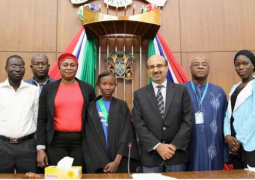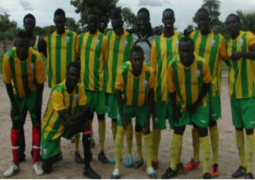
The Special Criminal Court in Banjul yesterday adjourned the criminal case involving Lawyer Ousainou Darboe and 19 others, to decide whether or not to stay its proceedings on counts 5 and 6, and refer the two counts to the Supreme Court for determination as applied for by the accused persons.
They were indicted on a seven-count of unlawful assembly, riot, incitement of violence, riotously interfering with vehicles, holding a procession without a permit, and disobeying an order to disperse from an unlawful and conspiracy, which they all denied.
The accused persons on the amended charge sheet are Ousainou Darboe, Kemeseng Jammeh, Femi Peters, Lamin Dibba, Lamin Jatta, Yaya Bah, Babucarr Camara, Fakebba Colley, Ismaila Ceesay, Momodou Fatty, Dodou Ceesay, Samba Kinteh, Mamudou Manneh, Nfamara Kuyateh, Fanta Darboe, Lamin Njie, Jukuna Suso, Momodou L.K. Sanneh, Yaya Jammeh and Masanneh Lalo Jawla.
When the case was called, DPP S.H. Barkun appeared for the state alongside with the Deputy DPP M.B. Abubacarr.
The defence team was led by Senior Counsel A.A.B. Gaye along with A.N. Bensouda, H.S. Sabally, O.M.M. Njie, A. Samba, R.Y. Mendy, N. Cham, L.S. Camara, Lamin Darboe, M. Bachilly, Yasin Senghore, A. Sissoho, M.M. Bittaye, and S.M. Tambadou, and Combeh Gaye, among others.
The DPP then informed the court that at the last sitting the defence counsel asked the court to transfer two out of the seven counts the accused are facing to the Supreme Court, on the grounds that the two counts are predicated on an Act of the National Assembly which was in excess of its powers.
“The second issue is that the said Act, which is the Public Order Act, is not in harmony with section 25 of the Constitution. The question before this court is not to determine the competence of the National Assembly.
“The question before this court was whether the accused persons are guilty or innocent of the charges against them on 28 April, 2016,” he said, adding that the jurisdiction of the court had been conferred in this case by filing the bill of indictment and arraigning the accused persons accordingly.
“It should be noted, my lord, that the accused persons were first arraigned on 20 April 2016, and their pleas were taken on that very day. Subsequently, my lord, the prosecution amended the charge on 28 April 2016 and yet the plea of the accused persons was taken.
“It is also well-noted that no objection was made as to the competence of the charge before their respective pleas were taken in this respective dates before their plea. My lord, that gave this court the jurisdiction to try the charges before it,” the DPP added.
Submitting further, he said: “My lord, by virtue of section 217 of the Criminal Procedure Code, objection of whatever nature should be made or taken before the plea of the accused persons is taken. Where that is not done, it can be assumed that all is well and that the defence is not objecting to the charge.”
An objection was made on counts 5 and 6 dealing with the Public Order Act on the grounds that the Public Order Act was made in excess of the powers conferred on the National Assembly, and it concluded that the court should transfer the two counts to the Supreme Court, he continued.
He added that, “the question is: How do they send that to the National Assembly for determination.”
He said that section 127 subsection 1(a, b, c) addressed the issue and asked, “How can we say that the legislative power of the National Assembly was made in excess?
“Is it by mere saying that a particular law is made in excess of the powers of the National Assembly that the court will be compelled to send it to the National Assembly.”
The DPP further said the excessive powers should be explained in black and white to the court before the court could act on such application.
“What is lacking at this stage is that the applicant has not shown how the legislative powers of the National Assembly have exceeded their powers. If the application of the learned counsel is something to go by, then no progress can be made in any criminal matter or proceedings the court will be compelled to stop any proceedings by mere saying or bogus application.”
At that juncture, senior Counsel Hawa Sisay-Sabally intervened and responded, saying, “My lord, I hope my learned friend is not saying that my application is bogus.”
The DPP, however, denied saying that.
The DPP said the applicants’ counsel ought to have used section 100 subsection 2 a, b, and c of the constitution in relation to the case before any decision would be taken.
He said the laws could not be made in excess by the mere fact that “it is inconsistent with the constitution.”
He, therefore, stated that the application of the applicants “lacks substance”, and urged the court to refuse it and allow the state to proceed with the case.
Replying on points of law, Counsel Hawa Sisay-Sabally said: “It was never in our submission for these counts to be transferred. There is a distinction between transfer and refer.”
On section 217 of the CPC, she said DPP argued that they were taking an objection and they took the objection after the plea of the accused persons was taken.
She said section 217 of the CPC deals with formal defects of information and not constitutional issues.
“We have not taken any objection on formal defects on counts 5 and 6. To show the court that this section has no relevance to the application, I will refer the court to Saho versus IGP and others reported in 1997 to 2001, which is a criminal case. It is not right for DPP to argue that it was only Sabally’s case that was referred. Therefore, section 217 is not relevant to the application.”
She added that the constitution did not state that for the court to refer the counts to Supreme Court they have to analyze the facts, adding that the trial judge did not have the jurisdiction to determine whether or not the counts should be referred to the Supreme Court.
She said the “Black Law Dictionary” used by the DPP had no relevance to this court, stating that the constitution of The Gambia supersedes the dictionary.
She added that the interpretation of a constitution is different from that of a statute.
“My submission is that what is important here is that when the issue of constitution arises and not what the court determines; otherwise section 4 of the constitution is redundant,” she said.
Counsel further stated that the accused persons need not to persuade the court “when the matter arises because there is no discretion.”
“It is my submission that the argument is severely flawed having regard to the clear language of section 127 (a) of the constitution, which states ‘Exclusive Jurisdiction.’ We realise that this particular section does not confer exclusive jurisdiction to the high court. In this case it is concurrent jurisdiction to the high court,” she said.
She added that it was not mere saying, because “it comes from people who are before the court and denied bail”.
“I urge the court to interpret this provision and arrive at one decision, which is to refer the counts to Supreme Court for determination, and to disregard the argument of the state which is severely flawed and misconceived.”
The case was adjourned until 16 May 2016.
[endif]


